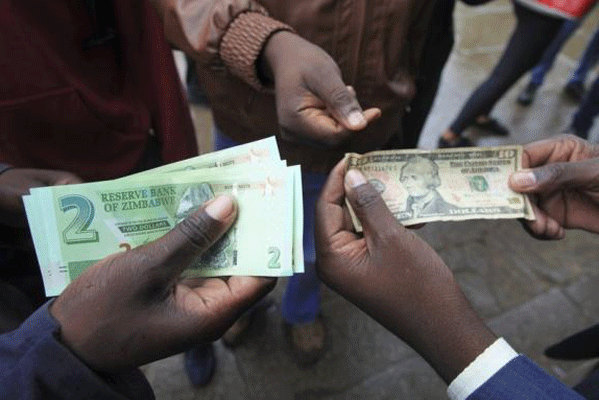
By Alexander Maune
DAVID Bowie states that tomorrow belongs to those who can hear it coming. A profound change is taking place before our eyes, a monetary climate change.
This monetary climate change has far-reaching implications — for monetary policy, fiscal policy, and investment decisions. Three key aspects to this change are budgetary nonchalance, the merging of monetary and fiscal policies, and the creation of new tasks for monetary policy.
What is meant by monetary climate change?
Ronald-Peter Stoeferle and Mark J Valek (2021) in their annual report, “In Gold we trust,” refer to it as a multilayered paradigm shift, the breakthrough which was triggered by the COVID-19 pandemic and the political reactions to it.
The COVID-19 crisis has the potential to shake up the unbacked monetary system (fiat currency system) and could ultimately shorten its remaining life expectancy significantly.
Central bank digital currency
Kraken Intelligence argues that while the concept of CBDCs (central bank digital currency) was inspired by cryptocurrencies like bitcoin, the ethos of CBDCs show a stark contrast from the ethos of cryptocurrencies in that they are issued by the State as a centralised form of digital money.
- Chamisa under fire over US$120K donation
- Mavhunga puts DeMbare into Chibuku quarterfinals
- Pension funds bet on Cabora Bassa oilfields
- Councils defy govt fire tender directive
Keep Reading
Stoeferle and Valek argue that in the reshaping of the global monetary order, China continues to work on all fronts to undermine the hegemony of the US dollar. In this struggle, China has opened another front, the digital front. While the digital yuan is already making its first real-world test runs, the eurozone is only in the early planning stages.
These developments aside, central banks (CBs) once again emerged as net gold buyers in 2020, albeit at lower levels. It is noteworthy that Hungary recently tripled its gold reserves and Poland announced a significant increase in gold reserves in the coming years.
Digital ambitions around the globe
According to Bloomberg, among those CBs that have some form of CBDC on their radar, there are currently three zones, apart from the Bahamas, that have already introduced a CBDC in 2020, the ‘Sand Dollar.’
In Asia and South Africa, plans are already fixed and tests with CBDCs are underway. In Europe and Russia, plans are being prepared and CBs have made it clear that they see CBDCs as the future. In the US, UK, Australia, and Japan — the core countries of the US dollar bloc — CBs are merely experimenting and see no reason to hurry.
The PWC top ten retail CBDC initiatives “project maturity” in its order include Bahamas (92), Cambodia (83), Mainland China (75), Ukraine (71), Uruguay (71), Ecuador (71), Eastern Caribbean (61), Sweden (58), South Korea (51), and Turkey (42) among the 60 CBDC worldwide as of May 20 2021. No African country is in the top ten.
Saheli Roy Choudhury, in an article titled “India could begin trials for a digital rupee by December, central bank,” quotes Shaktikanta Das, who told CNBC`s Tanvir Gill that the Reserve Bank of India may launch its first digital currency trial programmes by December this year.
Das adds that the RBI is also exploring the choice between having a centralised ledger for the digital currency or the so-called distributed ledger technology (DLT). The DLT allows multiple participants to access, share, and record transactions simultaneously. While a centralised ledger means the database is owned and operated by a single entity, the CB.
To Stoeferle and Valek, one aspiration of many CBs is to hastily introduce a CBDC. The CBDCs are a wolf in sheep’s clothing. It seems as if the excitement around “digital assets” is being exploited to market State-owned digital currencies as a great achievement. The Kraken Intelligence (April 2021) publication refers to CBDCs as “digitised fiat currency”.
A monetary world backed by gold
A new monetary world order must be anchored on something tangible. That tangible asset is likely to be gold. However, it is less likely to be a replica of the old system, but rather gold-backed digital currency centralised by one or several central banks. The Chinese central bank, the People’s Bank of China (PBoC) has already launched their CBDC with aspirations to soon be used in international trade settlements and eventually even used as legal tender in jurisdictions outside China and between third-party countries. China may even retain control over their capital and financial accounts whilst internationalising its digital renminbi. But for it to be trusted in a world with runaway inflation, it is paramount that it is anchored on gold. Why gold? The answer is “True gold fears no fire” to quote the Chinese proverb.
China has long been one of the most important players in the gold market. In 1983, China allowed private gold ownership, but trade was reserved for the PBoC until 2001. Today China is the world’s largest gold-producing country, the largest gold consumer, and the largest gold importer. It is argued that not a single gramme of gold extracted from the earth in China, or imported by China, leaves the country.
Gold is a physical manifestation of money and has emerged throughout human history as the most trustworthy store of wealth. Although gold is not currently defined as legal tender, its reputation and trustworthiness as the money remain unblemished. Hence, it should not surprise that the world’s central banks collectively hold 33,919 tonnes or about 17,2% of the world’s gold reserves in their vaults as reserve assets.
No fiat currency has survived the test of time. They have all failed to be a reliable store of wealth. French philosopher Voltaire (1729) states that: “All paper money eventually returns to its intrinsic value: Zero.” According to Allan Greenspan, “…Gold is a currency. It is still, by all evidence, a premier currency. No fiat currency, including the dollar, can match it.”
What is happening close to home?
According to Sarah Smit in an article titled “South Africa joins digital currency race,” the South African Reserve Bank has embarked on a study to investigate the feasibility of a CBDC following a growing number of central banks around the world.
According to a statement from the bank, argues Smit, the study will focus on the issuance of a domestic CBDC that can be used by consumers in South Africa for general retail purposes.
Smit states that in 2018, South Africa’s intergovernmental fintech working group launched Project Khokha, which replicated interbank clearing and settlements using a blockchain network.
Earlier this year, the working group announced the second phase, Project Khokha 2. The project will issue, clear and settle debentures on a distributed ledger using tokenised money. South African financial institutions such as Absa, FirstRand, Investec, JSE, Nedbank, Standard Bank, Strate are taking part in the project. The CBDC feasibility study is expected to be concluded in 2022.
Is Zimbabwe in the picture?
The Reserve Bank of Zimbabwe (RBZ) in December 2017 issued a statement declaring that virtual currencies did not have legal tender status in Zimbabwe. What they failed to realise was that virtual currencies are people’s money that does not need the blessing of the CB. This has been the case the world over. The CB was caught unaware by the public.
The CB argued that the use of and trading in cryptocurrencies or virtual currencies was not regulated by the country’s laws and present risks such as money laundering, terrorism financing, tax evasion, and fraud. Under the existing legal and regulatory dispensation, any person who invests in virtual currencies or participates in any transaction involving virtual currencies does so at his own risk and will not have legal protection from, or recourse against any regulatory authority.
The CB sounded sincere but one is then forced to ask the obvious question: Who is protecting us from the effects of inflation or is there any recourse whatsoever?
In May 2018, the RBZ issued a circular ordering all financial institutions not to use, provide banking services, and to terminate any existing relationships with virtual currency exchanges.
In March 2020, the RBZ changed its tone and announced its intent to regulate rather than completely ban cryptocurrency. Maybe they felt the pressure or irresistibility of the cryptocurrency wave.
Instead of killing innovation, the CB must create an enabling environment for players in the hi-tech sector. Regulators must foresee the future.
They need to up their game for them to remain relevant and effective especially in this technological era. An era driven by 5G, IoT, AI, big data, and algorithms.
There is talk that Zimbabwe is also pursuing a partnership with a foreign fintech company to develop and launch a gold-backed digital currency for its citizens. The news sounds great, though we are yet to see the progress and whether we have the amount of gold enough to back the so-called digital currency.
What I fail to understand is our preference for foreign developers on such critical assets? Why can’t we use our local companies, why can’t they come on board? If SA is doing it, why can’t we do it as well? Don’t we have the capacity and capability to do so? If that’s the case, we are doomed as a nation. Why can’t we send our students and developers on exchange programmes to these developed countries to learn some of these technologies? Is the Presidential Scholarship programme helping the country or not? These are some of the questions that no one will answer.
For how long will we remain behind? We are a continent with the youngest generation in the world, it’s high time we empower our youths with critical skills that shape the world. One needs to see the technologies coming from countries like Israel for one to realise how far we are from civilisation.











